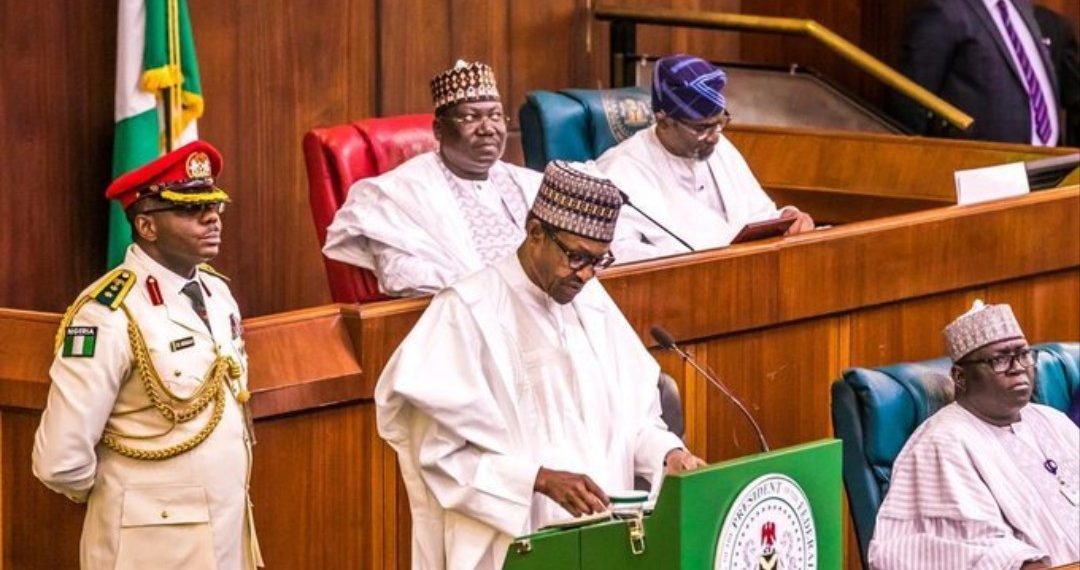334
… To borrow N8.8 trillion
President Muhammadu Buhari on Friday presented N20.5 trillion budget to the joint Sitting of National Assembly saying the 2023 Budget was prepared amidst a very challenging world economy.
He explained that the economy is weakened by the lingering effects of the COVID-19 pandemic, high inflation, high crude oil prices resulting in huge cost of PMS Subsidy and negative spill over effects of the Russia-Ukraine war.
He said that many economies around the world are currently contending with fiscal instability, slow growth, food crisis, and high interest rates. Like many other countries, our economy faces headwinds from low revenues, high inflation, exchange rate depreciation and insecurity.
Buhari while presenting the N20.5 trillion budget quoted that Nigeria’s real Gross Domestic Product grew by 3.54 percent in the second quarter of 2022, marking the seventh consecutive quarter of growth.
He said, “Despite continuing efforts, unemployment, underemployment, and poverty rates remain high. We are currently implementing several skills development programmes and work opportunity programmes to enhance the employability of our youths and tackle the troubling level of youth unemployment.
“While it is evident that our economy still faces significant challenges, what could have happened without the implementation of some of the measures we introduced, would have been much worse for the country.”
The presentation of the budget was sequel to National Assembly approval of Medium-Term Expenditure Framework (MTEF) and fiscal strategy paper (FSP) — parameters on which the 2023 budget will be framed.
While presenting the details, Buhari said the 2023 transition budget was designed to address critical issues and lay a solid foundation for the incoming administration.
He said that based on the parameters and fiscal assumptions, the revenue generation should hit about N16.87 trillion.
The budget is christened ‘Budget of Fiscal Consolidation and Transition’.
A breakdown of the budget shows that N744.11 billion was earmarked for statutory transfers, N8.27 trillion for non-debt recurrent costs, N1.1 trillion for overhead costs, and N5.35 trillion for capital expenditure.
Buhari said, “We expect the total fiscal operations of the federal government to result in a deficit of N10.78 trillion.
“This represents 4.78 percent of estimated GDP, slightly above the 3 percent threshold set by the Fiscal Responsibility Act 2007.
“As envisaged by the law, we need to exceed this threshold considering the need to continue to tackle the existential security challenges facing the country.”
He added, “Total federally distributable revenue is estimated at 11.09 trillion Naira in 2023, while total revenue available to fund the 2023 Federal Budget is estimated at 9.73 trillion Naira. This includes the revenues of 63 Government-Owned Enterprises.
“Oil revenue is projected at 1.92 trillion Naira, Non-oil taxes are estimated at 2.43 trillion Naira, FGN Independent revenues are projected to be 2.21 trillion Naira. Other revenues total 762 billion Naira, while the retained revenues of the GOEs amount to N2.42 trillion Naira.”
Buhari explained that the budget deficit will be financed mainly through borrowings.
He said this would include new borrowings totalling N8.80 trillion, N206.18 billion from privatisation proceeds and N1.77 trillion drawdowns on bilateral/multilateral loans secured for specific development projects/programmes.
Speaking on Petrol subsidy, he said that the current reality shows that the Petrol subsidy is no longer sustainable adding that government will provide safety nets to cushion the effect of subsidy removal.



